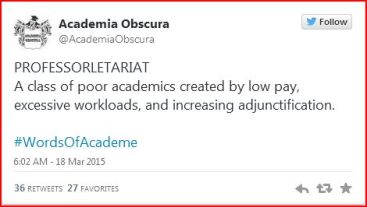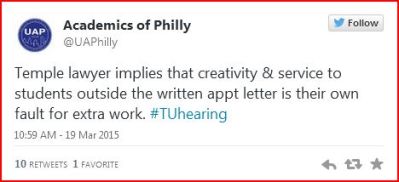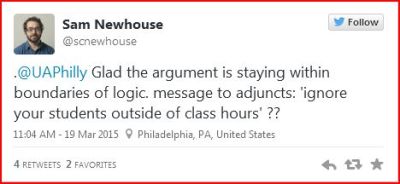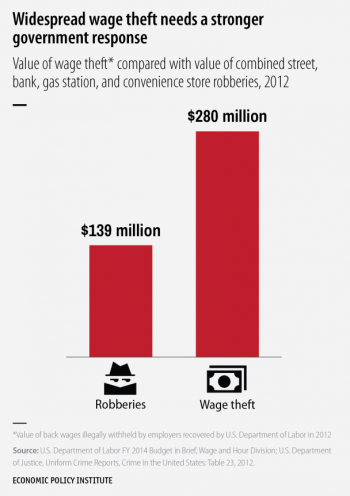21 March 2015
Whatever the outcome of the Pennsylvania Labor Relations Board (PLRB) hearing on Temple University (TU) adjuncts’ bid to vote on unionization, the proceedings spotlight the crux of adjunctification: when telling adjuncts to only do the work stated in our tentative assignment agreements, what admin means is, Psst! meanwhile, we will rely on your dedication to students to work off the clock.
Here’s an overview of the situation in case you missed it:
Hundreds of the university’s adjunct faculty petitioned the Pennsylvania Labor Relations Board in December [2014] for the right to vote on joining the Temple Association of University Professionals union, which already represents 1,400 full-time faculty members. In a Feb. 17 letter to the Temple News, the TAOC wrote, “Unfortunately, Temple administration is delaying the process because they don’t respect us. Provost [Hai-Lung] Dai continues to send misleading and offensive emails to adjunct faculty discouraging us from unionizing. His actions show that he regards us as nothing more than cheap labor.”
To be clear, this is a seminal moment, for the TU adjuncts’ fight for voting rights is a weigh station on the long snaky path that is the vicious cycle of precarious academic labor, or, as Academia Obscura duly notes, the Professorletariat.
The PLRB hearing began Thursday, March 19 in Harrisburg, where, in the words of Temple Association of University Professionals (TAUP) president Art Hochner, six adjunct faculty members testified as to “their impressive educational credentials, their teaching, their interaction and collaboration with full-time faculty, and the activities outside of the classroom that they involve students in to enhance educational goals.” Sounds like adjuncts doing the bang up job on which we pride ourselves, right?
Sadly though not surprisingly, Hochner’s assessment isn’t shared by the official voice of Temple administration, as revealed by live tweeting of the event from adjuncts, allies, and the United Academics of Philadelphia (@UAPhilly) local using a #TUhearing hashtag. No, rather than being treated like the human beings, citizens and public servants they are, the witnesses were treated to a rather antagonistic mode of operation by Temple’s attorneys. Summing up the day, one witness wrote about being “dismayed by the demeaning way [in which she and her] colleagues were spoken to by Temple’s representatives”:
I did not feel valued or appreciated by my employer, regardless of what they try to tell us on campus. In Harrisburg, Temple made it clear they view our service and devotion to our students and to Temple as ‘voluntary’ and we could ‘just go home’ [if we thought we were working so many hours sans pay].
United Academics of Philadelphia’s correspondent put the matter squarely, tweeting in response to witness descriptions of the long unpaid hours adjuncts give in service to their students:
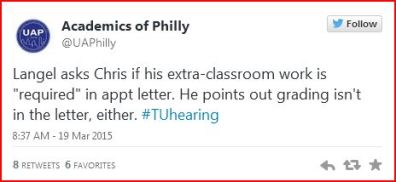
[NOTE: references are to TU attorney John Langel and TU adjunct Chris Raab]
The @UAPhilly citizen journalist ultimately shows dissatisfaction with the way TU attorneys suggest that adjuncts are free to not work outside the hours stipulated by our tentative assignment agreements.
Hm. Well, concerned fellow twitizens had quite a bit to say about this idea, slyly summed up by local Metro Philly news reporter Sam Newhouse, who noted the complete illogic of such an approach:
Educators and, yes, lay citizens know that it’s impossible to carry out the duties of teaching strictly within the confines of the hours spent with students. As well we know, along with the complementary cycle of assessment and evaluation (grading), precious contact hours are the end result of many more hours spent outside class researching and preparing: syllabi, calendars, lesson plans, handouts, presentations, questions, tests, prompts, demonstrations, just to name a few items on the educators’ daily to do list, and we haven’t even mentioned administrative duties such as inputting grades, record keeping and email.
But it looks like Temple would rather adjuncts divide class time between teaching and the long list of steps that equate class time. How would that work? Students sit idly by in class as we do all the unpaid hours of work that goes into every contact hour? Sam Newhouse’s wry comment shows the absurdity of the TU attorneys’ argument.
Never mind that the lawyers raised this notion directly in reference to witness David White’s explanation of how many hours he gives his students outside class in order to help them put on a one act festival – a point the lawyers will surely try to stick. But don’t believe the hype. As one twitizen observed, the “gap between [University attorneys and University operations] is never more apparent than in these fora. They’re very lucky no one takes them up on it.”
The admin attorneys let the cat out of the bag on this one, though, because using David White as a vehicle, every adjunct is being told that any hours we put in outside class are freebies. And as such, not only should non-contact work hours be donated by us, we have no right to expect compensation, that it’s our choice to perform duties not stated in our assignment agreements. The laughter you hear is the unstated irony turned weapon every adjunct knows: one cannot teach on contact hours alone.
Wow, let me say that another way because framed a wee bit differently, the concept is so heartwarming yet clearly 21st century un-American, it bears repeating: the company is relying on my honor and good will to work many more unpaid hours than paid.
And here we have the crux of adjunctification, the loud clear message to public education that what’s wanted not only in academic but global labor is an all precarious workforce all the time. That’s the future of public education encroaching year by year: not the Professoriate, but the Professorletariate. If we think a 75% part-time academic workforce is outrageous, consider the day when we hit 99%. Not quite 100% because there’ll be a +/- 1% margin for full time non-management overseer positions a la chairs, plus various superstar or endowed positions receiving twice or three times the going rate for what were once known as tenured faculty.
This isn’t a pleasant thought, and I’d love to be able to muster the forces needed to fight against it, but in reality, Americans are pinned by the weight of decades of austerity measures and corporatized political power. Our attempts to fight back are decidedly reactive, and if we’re going to save our education system, save ourselves, we’re going to need some proactivity.
And so the #TUhearing is actually a clear sign of #HEnotHearing. The hearing signals a resounding need for investigation of not only widespread labor malpractice but undue corporate-political influence. This doesn’t have to be done by the government, although that’d be nice. There are plenty of leads to go around for professional and citizen journalists alike.
At the end of the day, as an adjunct, I very much want to see the Temple adjuncts be allowed to exercise their right to vote. As a citizen, I’m appalled that fellow Americans would even have to take such a notion to court.
#InvestigatePublicEd

